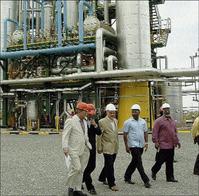
Commerce Minister Phillip Paulwell (second right) and late Ambassador Peter King (right) tour the Petrojam Ethanol Dehydration Plant in Kingston with members of a Brazilian delegation in November 2005. Brazilian President Lula da Silva, during his two-day visit to Jamaica, will participate in the inauguration of an ethanol plant in Port Esquivel, St. Catherine. A number of Caribbean and Latin American nations are pursuing ethanol GEORGETOWN, Guyana (CMC):
The Caribbean must win the battle against expensive fossil fuel which has spawned economic hardship across member states, says Caribbean Community (CARICOM) Secretary General Edwin Carrington.
Addressing the two-day high-level seminar on 'Expanding Bio-Energy Opportunities in the Caribbean', Carrington said regional economies must win the battle "to reduce dependence on oil, save on energy costs, and save the local and global environment - a tall task indeed, but not an unachievable one."
In his presentation, Carrington touched on the continuing geopolitical tensions in the Middle East; political instability in some major oil-exporting countries; minimal spare-refining capacity among Organisation of Petroleum Exporting Countries (OPEC); supply disruptions in other parts of the world; and the rapidly increasing global demand.
Consequences

Caricom Secretary General Edwin Carrington. - File photos
"This international picture could potentially have far-reaching consequences for the economies of CARICOM, for many reasons," the CARICOM secretary general said at the talks which ended yesterday.
Consequently, Carrington argued that the time was opportune for the region to pursu to the ever-increasing fossil fuel.
"Of particular concern for us is the drain on foreign exchange from member states which, in some instances, could be as high as 70 per cent of their export earnings.
"Also of interest is the extremely high degree of dependence on fossil fuels. At present, it is estimated that approximately 93 per cent of commercial energy consumption in the Caribbean is derived from petroleum products," Carrington said.
The CARICOM official said the fossil-fuel dependency, together with other factors such as the lack of economies of scale and the lack of interconnectivity among member states, translated into high prices for secondary energy sources such as electricity.
"In view of the economic, commercial and political context of the region's energy sector, renewable energy in general, and bio-energy in particular, must therefore be carefully considered," he said.

